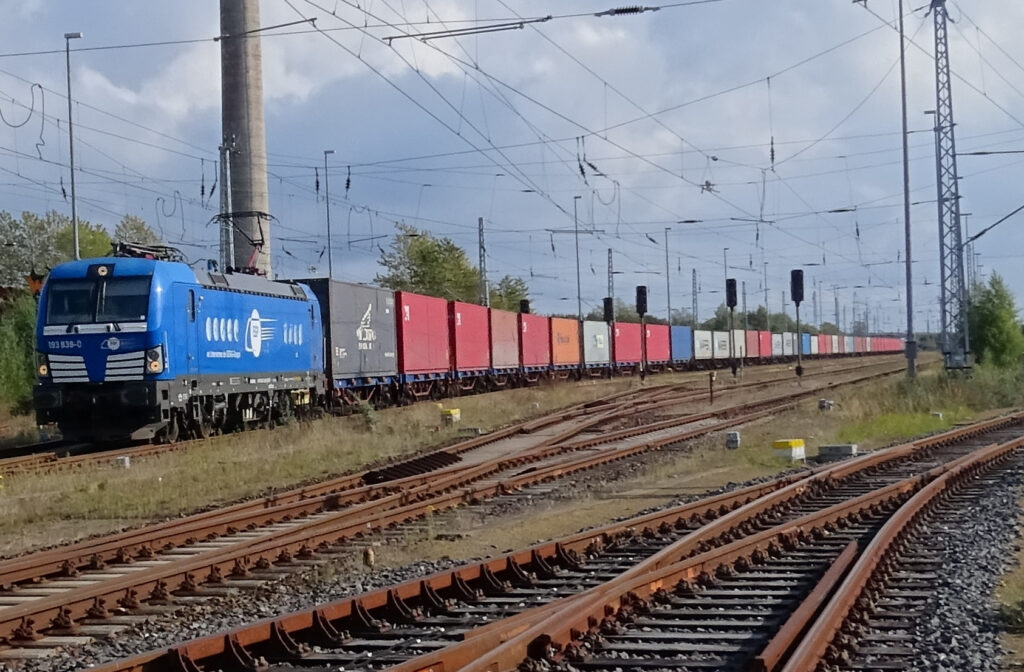Port Expands Hub for New Silk Road
30th October 2020

Mukran Port significantly expanded its transport connections on the New Silk Road in October. In addition to a direct container train between Mukran and Rotterdam, weekly short sea services to Scandinavia (Karlshamn, Sweden) and Lithuania (Klaipeda) now complement the Baltic Sea Port’s service portfolio. In addition, Mukran is adding the ElbePort Wittenberge to its network of German hinterland hubs. A second ship now operates four departures in each direction on the Mukran-Baltijsk route.
The new transport links serve the European pre- and post-carriage of containers on the ‘Baltic Sea Bridge’ – a transport corridor between Mukran and Xian in central China, which has now established a permanent part of the New Silk Road. Mukran Port can thus further strengthen its hub function in international freight traffic with China. “The new services are an excellent addition to our existing network, which already includes numerous hubs in Germany and the Baltic Sea region. We are now connecting further markets in Scandinavia and continental Europe to China,” says Harm Sievers, Managing Director of Mukran Port Terminals GmbH, summarizing the importance of the new connections. In order to continue to handle the increasing demand on the Baltic Sea Bridge, the capacities on the main route to Baltijsk in Russia were doubled. Since mid-October, a second ship, the ‘Ulrike G’, has been in service there. “Once again Mukran can thus demonstrate its capabilities as a modern multi-functional port and European hub for China traffic,” says Arne Ehlers, Managing Director of the shipping company BREB, which handles the charter process for Baltic Sea Bridge.
The targeted expansion of the China traffic is based on close cooperation between Mukran Port, DBO Bahnoperator GmbH and Eisenbahngesellschaft Potsdam mbH (EGP). The cargo capacity for the connection of Scandinavia to the New Silk Road was chartered by the shipping company DFDS especially for this purpose. The new short sea services between Mukran, Karlshamn and Klaipeda will in future run once a week in both directions. The same shipping frequency also exists on the route between Mukran and Klaipeda, on which part of the cargo is shipped to China.
Currently the partners are jointly developing a direct container train line between Mukran and Rotterdam. Here they are initially planning a weekly departure in both directions too. As confirmed by the first test phase in September and October with several round-trips, the train will need just 36 hours for the 1,800-kilometer rail route, including the respective terminal services in the ports.
The operator is EGP, which also handles the ElbePort Wittenberge. This trimodal transshipment terminal in Brandenburg enables the cooperation partners to further expand the short sea traffic between Mukran, the Kaliningrad region, Sweden and Lithuania in the container sector in a targeted manner. The ElbePort offers access to overseas connections via for example Bremerhaven and Hamburg. A connection via Cuxhaven to Great Britain is in preparation.
“Thanks to its geographical location, Mukran Port is the ideal logistics hub for these transports between Asia and Europe,” says Marcel Stein, Managing Director of DBO Bahnoperator GmbH. “The Xian route in Central China-Mukran is much more time-efficient for these transports than the traditional overland route via Poland and Germany, from where onward transports to Scandinavia and the Baltic States are carried out. In addition, the handling via Mukran also enables us to handle trains for Western Europe with up to 50x40ft containers in the same way as in China”.
Christian Becken, authorized Signatory and Project Manager for intermodal transport at EGP, mentions another advantage of the rail link via Mukran in addition to saving time: “On this connection we can use a train of 740 meters length. This is a significant increase in train length compared to the Polish infrastructure and enables us to combine transports between China and Europe, but also within Germany and Europe”. EGP uses modern electric locomotives owned by the company as well as its own container wagons for the transports. https://www.mukran-terminals.de/

